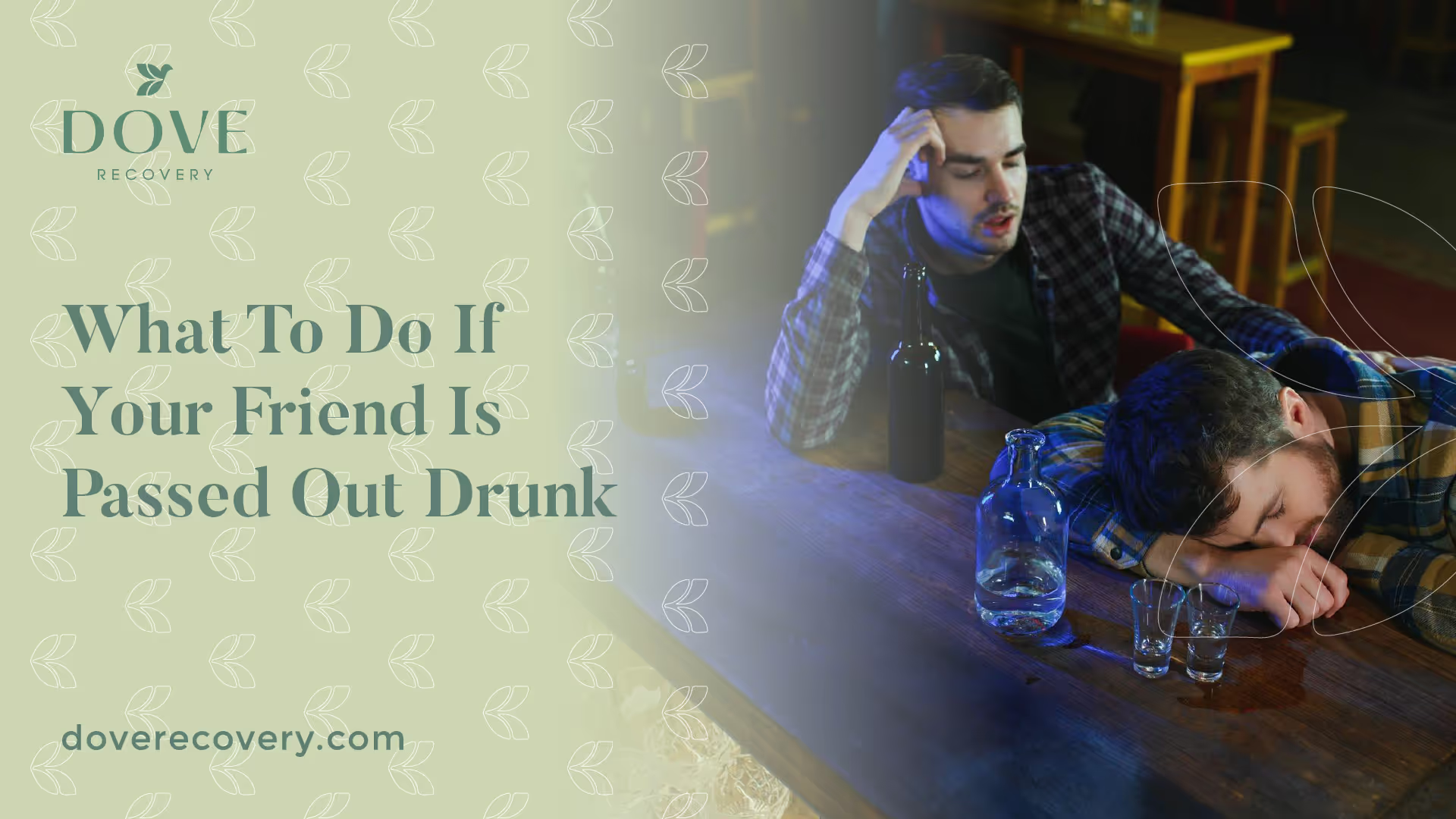What To Do If Your Friend Is Passed Out Drunk


We've all been there - a night out with friends that took one too many shots or had a few too many drinks. While it may seem funny at first, alcohol poisoning is a very real and dangerous possibility. If you find yourself in a situation where your friend has passed out drunk, it's important to know how to safely wake them up.
Why Does Alcohol Make People Pass Out?
Alcohol is a depressant that affects the central nervous system, slowing down brain activity and causing the body's functions to slow down as well. When someone consumes too much alcohol, their blood alcohol content (BAC) reaches levels that can interfere with their ability to breathe properly and cause them to pass out.
Additionally, consuming large amounts of alcohol can lead to dehydration, which can also contribute to a person passing out. It's important to remember that everyone's tolerance for alcohol is different, so what may cause one person to pass out may not have the same effect on another person.
Waking Up a Drunk Person
If your friend is not showing signs of alcohol poisoning, there are a few ways to safely wake them up. It's important to take care of your friend and ensure they are okay.
Here are a few additional tips to help you wake up your friend safely:
1. Talk to Them
Talking to your friend in a calm and reassuring voice can sometimes be an effective way to wake them up. Try calling their name and asking them if they're okay. Offer them water and try to get them to sit up slowly.
2. Use a Wet Cloth
Using a wet cloth or washcloth can also help to wake up your friend. Gently wipe their face with a damp cloth or place a cool washcloth on their forehead.
3. Offer Them Food
If your friend is awake but feeling groggy, offering them food can help to stimulate their senses and wake them up. Try offering them something light, like crackers or toast.
4. Get Them Moving
Encouraging your friend to move around can also help to wake them up. Try taking a short walk together or doing some gentle stretches to get their blood flowing.
Remember, it's important to keep a close eye on your friend and make sure they're okay. If you're concerned about their safety or well-being, don't hesitate to seek medical attention.
How to Safely Transport a Drunk Person to the Hospital
If your friend is showing signs of alcohol poisoning, it's important to seek medical attention immediately. In some cases, this may mean transporting them to the hospital yourself. However, it's crucial that you do so in a safe and responsible manner.
Here are some tips for safely transporting a drunk person to the hospital:
1. Call for Help
Before attempting to transport your friend, call for professional medical assistance. This may include calling 911 or contacting your local emergency services. Explain the situation and follow their instructions carefully.
2. Keep Them Awake
While waiting for professional help to arrive, try to keep your friend awake and alert. Talk to them in a calm and reassuring voice and encourage them to stay conscious.
3. Support Their Head and Neck
When moving your friend, be sure to support their head and neck at all times. This will help prevent any potential spinal injuries or other harm.
4. Move Them Slowly
When moving your friend, do so slowly and carefully. Avoid sudden movements or jerking motions that could cause harm.
5. Don't Leave Them Alone
Never leave your friend alone while transporting them to the hospital. Stay with them at all times and continue talking to them in a reassuring manner.
Remember, if you're unsure of how best to transport your friend safely, wait for professional medical assistance to arrive before attempting anything yourself.
Monitoring Breathing and Pulse
If your friend has passed out, it's important to monitor their breathing and pulse. If they're unconscious, it can be difficult to tell if they're breathing or not. Here are some tips to help you monitor your friend's breathing and pulse:
1. Look for Chest Movement
One of the easiest ways to tell if someone is breathing is by looking for chest movement. Place your hand on their chest and look for any signs of rising and falling.
2. Listen for Breathing Sounds
If you can't see any chest movement, listen carefully for any sounds of breathing. Put your ear close to their mouth or nose and listen for any air moving in and out.
3. Check Their Pulse
Check your friend's pulse by placing two fingers on the side of their neck or wrist. Count the number of beats per minute. A normal resting heart rate is between 60-100 beats per minute.
4. Time Your Checks
It's important to check your friend's breathing and pulse regularly, especially if they're unconscious. Set a timer for every few minutes so you don't forget.
If you notice that your friend has stopped breathing or has an irregular heartbeat, seek medical attention immediately. Remember, it's always better to err on the side of caution when it comes to someone's health and safety.
How to Safely Position Your Friend's Body
If your friend has passed out or is vomiting, it's important to safely position their body to prevent choking and ensure their airway remains clear.
Here are some tips for safely positioning your friend's body:
1. Roll Them Onto Their Side
The recovery position is the safest way to position someone who is unconscious or vomiting. To do this, roll your friend onto their side, with their head tilted back slightly and their top leg bent at the knee to keep them stable.
2. Clear Their Airway
Once your friend is in the recovery position, make sure their airway is clear of any vomit or other obstructions. If necessary, use a cloth or tissue to wipe away any excess fluids.
3. Monitor Their Breathing
Continue to monitor your friend's breathing and pulse while they're in the recovery position. Check for chest movement and listen for any sounds of breathing.
4. Call for Medical Assistance
If your friend is showing signs of alcohol poisoning or if they continue to vomit excessively, seek medical attention immediately. Remember, it's always better to err on the side of caution when it comes to someone's health and safety.
By following these simple steps, you can help ensure that your friend stays safe while they recover from a night of drinking.
Signs of Alcohol Poisoning
While it's important to know how to wake up a drunk person, it's equally important to recognize the signs of alcohol poisoning. Alcohol poisoning is a serious condition that can be life-threatening if left untreated. Here are some signs to look out for:
- Confusion or disorientation
- Irregular or slow breathing
- Blue-tinged skin or lips
- Low body temperature (hypothermia)
- Vomiting
- Seizures
- Loss of consciousness
If your friend is showing any of these symptoms, it's important to seek medical attention immediately. Call 911 or take them to the emergency room right away. Remember, it's always better to err on the side of caution when it comes to alcohol poisoning.
Preventing Alcohol Poisoning
The best way to prevent alcohol poisoning is to drink responsibly. Here are some tips to keep in mind:
- Pace yourself and drink water between alcoholic beverages.
- Eat a meal before drinking to slow down the absorption of alcohol.
- Avoid drinking games or shots.
- Know your limits and stop drinking before you get too drunk.
How to Avoid Passing Out From Alcohol
While it's important to know how to wake up a drunk person, it's equally important to avoid getting too drunk in the first place. Here are some tips to help you avoid passing out from alcohol:
- Pace yourself: Drinking too much too quickly can raise your BAC to dangerous levels. To avoid this, pace yourself and sip your drink slowly.
- Drink water: Alcohol is dehydrating, so make sure you drink plenty of water between alcoholic beverages. This will also help you feel fuller and may reduce your overall intake.
- Eat before drinking: Eating a meal before drinking can slow down the absorption of alcohol into your bloodstream, reducing the chances of passing out.
- Stick to low-alcohol drinks: Beer and wine generally have lower alcohol content than spirits like vodka or whiskey. If you're looking to avoid passing out, stick to these lower-alcohol options.
By following these tips, you can enjoy a night out with friends without putting yourself at risk of passing out or experiencing alcohol poisoning. Remember, always drink responsibly and look out for your friends' safety as well.
Conclusion
If your friend has passed out drunk, it's important to take action to ensure their safety. Check for signs of alcohol poisoning and call 911 if necessary. If they are not showing signs of alcohol poisoning, there are a few ways to safely wake them up. Remember to always drink responsibly and look out for your friends.
Sources:
- Mayo Clinic: https://www.mayoclinic.org/diseases-conditions/alcohol-poisoning/symptoms-causes/syc-20354386
- Healthline: https://www.healthline.com/health/alcohol-poisoning
- American Addiction Centers: https://americanaddictioncenters.org/alcoholism-treatment/alcohol-poisoning
